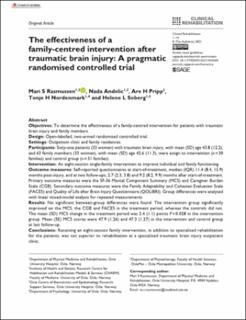| dc.description.abstract | Objectives: To determine the effectiveness of a family-centred intervention for patients with traumatic brain injury and family members. Design: Open-labelled, two-armed randomised controlled trial. Settings: Outpatient clinic and family residences. Participants: Sixty-one patients (33 women) with traumatic brain injury, with mean (SD) age 43.8 (12.2), and 63 family members (33 women), with mean (SD) age 42.6 (11.3), were assign to intervention (n=30 families) and control group (n=31 families). Intervention: An eight-session single-family intervention to improve individual and family functioning. Outcome measures: Self-reported questionnaires at start-of-treatment, median (IQR) 11.4 (8.4, 15.9) months post-injury, and at two follow-ups, 2.7 (2.3, 3.8) and 9.2 (8.2, 9.9) months after start-of-treatment. Primary outcome measures were the SF-36 Mental Component Summary (MCS) and Caregiver Burden Scale (CGB). Secondary outcome measures were the Family Adaptability and Cohesion Evaluation Scale (FACES) and Quality of Life after Brain Injury Questionnaire (QOLIBRI). Group differences were analysed with linear mixed-model analysis for repeated measurements. Results: No significant between-group differences were found. The intervention group significantly improved on the MCS, the CGB and FACES in the treatment period, whereas the controls did not. The mean (SD) MCS change in the treatment period was 2.4 (1.1) points P=0.028 in the intervention group. Mean (SE) MCS scores were 47.9 (1.26) and 47.3 (1.27) in the intervention and control group at last follow-up. Conclusions: Receiving an eight-session family intervention, in addition to specialised rehabilitation for the patients, was not superior to rehabilitation at a specialised traumatic brain injury outpatient clinic | en_US |

